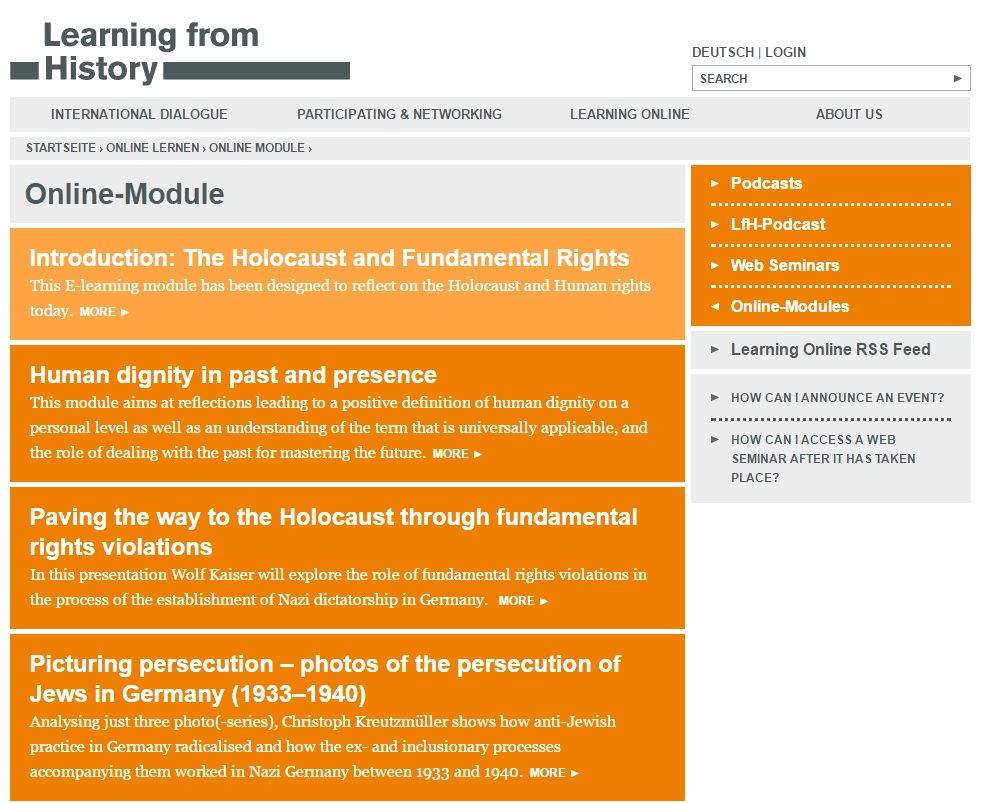Holocaust and human rights education
Objectives - Why this project and for whom?
The project on Holocaust and human rights education was created to inform policy makers and funding institutes about the current role that visits to original sites and historical exhibitions play in school education. The project aimed to assist school teachers and operators of commemoration sites, original sites and historical museums in their work on human rights education. The project also developed practical guiding material for school teachers and operators of commemoration sites, original sites and historical museums. The project brought together practitioners from a variety of fields.
Details - What did the project involve?
The project involved:
- a survey among governments of all EU countries;
- a survey among 22 commemoration sites, original sites and historical museums;
- stakeholder engagement and networking with practitioners: teachers, guides, educators;
- the development of an online toolkit on the Holocaust and human rights education;
- the selection of 9 EU Member States for an in-depth study of the role of commemoration sites, original sites and historical museums in Holocaust education and human rights education;
- focus group discussions with teachers and students for all the EU Member States selected for in-depth analysis;
- interviews with pedagogical experts and curators of the programmes and exhibitions that have been selected for in-depth analysis;
- an on-site assessment of the commemoration sites, original sites and historical museums selected for in-depth analysis;
- a conference in partnership with the European Commission and the Memorial Terezin, Anne Frank House and Danish Institute for International Studies;
- the setting up of a network of practitioners on Holocaust and human rights education.
Innovation - What's 'new' about the project?
The project went beyond the scope of previous projects in the field as it covered all Member States, with an in-depth study of 9 Member States. The study combined pedagogical, psychological and art of hosting expertise with social scientific expertise in order to produce:
- information on the contribution of commemoration sites, historical sites and historical museums to human rights education;
- guidance for curators, exhibition makers and educators of historical sites;
- guidance for schools and teachers;
- an online toolkit for teachers;
- networking opportunities for practioners;
- on-site advice-driven workshops with practitioners.
Outputs - What did the project deliver?
- A comparative analysis of the role of commemoration sites, original sites and historical museums in Holocaust education and human rights education in all Member States of the EU including an in-depth analysis of a selection of 10 EU Member States.
- A handbook for teachers
Excursion to the past - teaching for the future: handbook for teachers
Human rights education at Holocaust memorial sites across the European Union: An overview of practices
- An online toolkit for teachers on how to prepare a class using Holocaust and human rights education methodology
- An online module designed to reflect on the Holocaust and Human rights today
Online module: The Holocaust and Fundamental Rights

- Conference and meetings of practitioners
In many EU Member States, visits to memorials, commemoration sites, original historical sites and historical exhibitions play an important role in Holocaust education and human rights education. The FRA, therefore, decided to launch a project that studies the role that such visits play in school education across the EU from a comparative perspective. The project included an assessment of the pedagogical approaches and educational programmes of a selection of such sites in the EU.